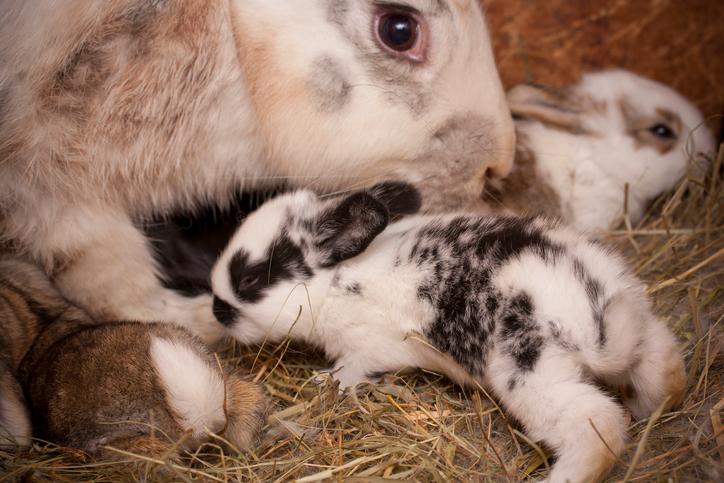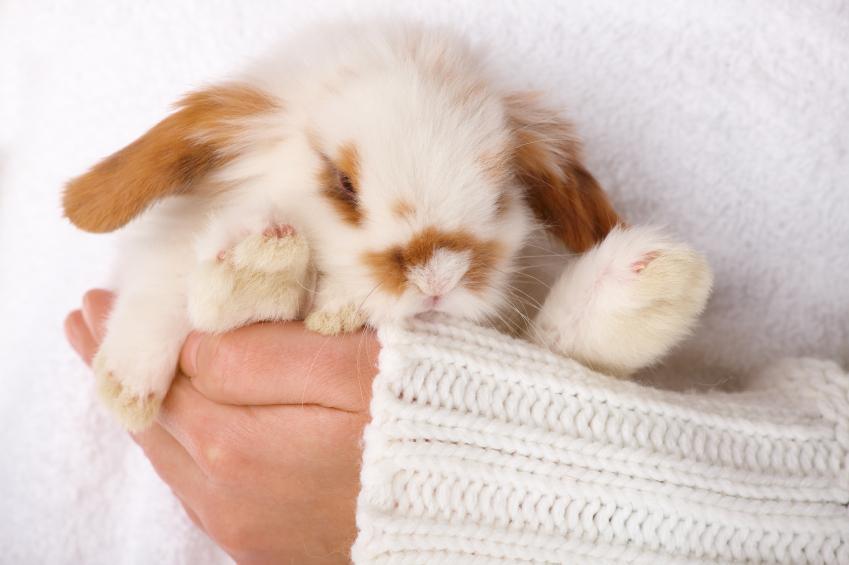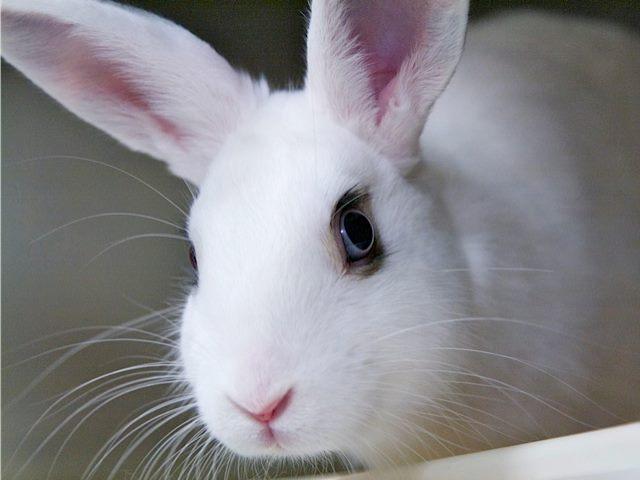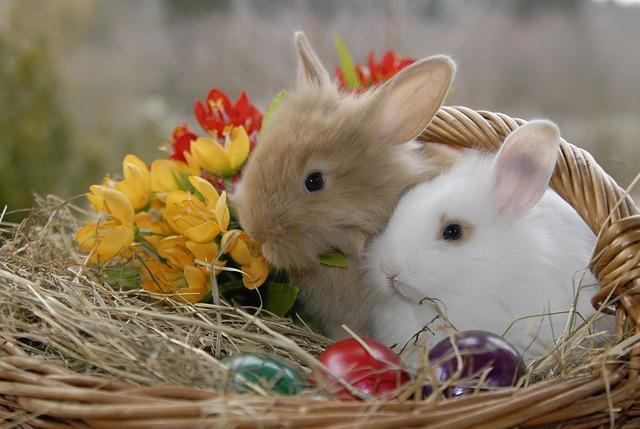Rabbit Pregnancy - Symptoms, Stages and Care



See files for Rabbits
Did you know that rabbits reach sexual maturity just a few months after they are born? That's right, rabbits can mate after just 4 to 8 months of life. So if your pet rabbit has a mate, you may be surprised with a litter sooner than you expected. After all, we all know the phrase ‘breeding like rabbits’. It is best to be prepared and learn all the facts about rabbit pregnancy - symptoms, stages and care - to be able to look after your pet during the crucial gestation period and after the baby bunnies (called kits) are born.
Pregnancy and giving birth is an important time in the life of your rabbit. In this article, AnimalWised gives you all the details you need to care for your pregnant rabbit: how to recognize signs and determine if your rabbit is pregnant, the duration and stages of pregnancy, and how to look after the female rabbit and her kits once they are born.
How do rabbits mate?
Rabbits reach sexual maturity and can mate at an early age. This is between 4 to 6 months for small to medium breeds, and between 6 and 9 months for large breeds. Male rabbits reach maturity slightly later than females. In fact, female rabbits can become pregnant after just 12 weeks. However, it is better to avoid this, as their bodies are not fully ready to bear the physical strain of pregnancy. At the other end of the spectrum, female rabbits over 4 years old should not be mated. They are too old for pregnancy.
Unlike other mammals, the rabbit does not go through cycles of heat. After its first heat period, a female rabbit goes through phases of heightened or lessened sexual activity, but it remains fertile. This means it can reproduce at almost any time of the year. While rabbits tend to prefer warmer times of the year for breeding, this does not mean that you can let your guard down if you do not want your rabbit family to multiply.
As the female rabbit is fertile all year round, she only has to approach the male for him to try to mount her. This initiates a process of induced ovulation. Once it begins, the female rabbit is receptive to the male during the first 12 or 14 days, known as the estrous period. She will reject him during the next 4 days, after which she will have another 12-day estrous cycle. If the copulation ends in fertilization, the pregnancy stage begins.
For more information about rabbit mating, look at our article on about how rabbits mate.
How to prevent a rabbit pregnancy
Of course, you may not want your rabbit to get pregnant. Separating males and females is not always effective. Sterilization or neutering is the best option for preventing an unwanted rabbit pregnancy. Consult your veterinarian for the best time to spay and neuter your pets.

How long are rabbits pregnant?
The gestation period or length of a rabbit pregnancy is between 28 and 31 days. The pregnancy can last for a maximum of 33 days. If this time passes and your rabbit has not yet given birth, you should take it to the vet immediately. After day 34, the fetuses could die in the womb it if they have not yet been born. A vet will be able to induce labor or surgically remove the babies.
Once a rabbit has given birth, it is imperative that you keep the male away. This is both to protect the kits and to prevent fertilization again, as conception is possible in the the first 72 hours after birth. This would not only be very stressful for your rabbit, but would also prevent it from caring for newborns during their lactation period. In fact, you should not mate your rabbit again for at least 42 days. Also keep in mind that mating your rabbit too often can put a strain on its health.
Stages and symptoms of rabbit pregnancy
Like all mammals, pregnant rabbits go through various phases, as the fetuses develop. What are the symptoms of a pregnant rabbit? How will you know if your rabbit is about to give birth?
Here is a timeline of the stages and symptoms of rabbit pregnancy to expect at each stage.
Stage 1: First signs
You may not have intentionally mated your pet. So, how to tell if a rabbit is pregnant? The first symptoms of pregnancy in rabbits usually emerge around day 10. One sign is mood change, and your bunny may become irritable or aggressive. The other tell-tale symptom is slight a swelling of the abdomen. You may notice the rabbit prefers to lie on its side because of this.
Stage 2: Development
Between day 11 and 14, if you put your fingers on the pregnant rabbit's belly (known as palpating) you can feel the fetuses as small lumps. After day 14, avoid touching or carrying the rabbit mother-to-be. During this stage, she is very delicate and careless handling could cause an accidental abortion. Similarly, do not allow the male to approach her. She may herself show signs of aggression to keep the male at bay.
Stage 3: Fur pulling and nesting
In this final stage of pregnancy in rabbits. It usually begins around day 28, or three days before giving birth. Symptoms of this stage include pulling fur and making a nest. The rabbit may push hay into a corner and will normally pull her own fur with her teeth to add to the nest. This makes a soft bed and infuses the nest with her scent, which is comforting to newborn kits. When you notice your rabbit pulling fur or making a nest, this is a clear sign that she will give birth within a couple of days.
Stage 4: Labor and birth
Labor in rabbits is known called kindling. Rabbits usually give birth at night or in the early hours of the morning hours, although they can also do so at some other time. The key is for them to feel safe and know that they will not be interrupted or disturbed. The process of labor in rabbits is not very long. It can last between 10 minutes to half an hour.
If you suspect your rabbit is pregnant but are not sure, or if she seems to be having trouble with labor, it is best to consult a veterinarian.
How to care for a pregnant rabbit
The gestation period in rabbits is usually quite calm. If there are fewer fetuses, you may even not notice major changes in your rabbits abdomen. However, this does not mean that you can simply leave it to its own devices. There are certain things to pay attention to, and it is best to provide your bunny with the best conditions for a a smooth and safe pregnancy.
Pregnant rabbit care
Food: Healthy development of the kits depend on the mother eating a healthy and varied diet. Diet also affects the pregnant rabbit's ability to produce milk. We suggest changing her diet from grass hay to alfalfa hay, and complementing it with pieces of carrot, tomato, parsley and lettuce.
Water: During pregnancy your rabbit will consume more water than usual. Make sure you always have a container of clean, fresh water within her reach. Refill the water trough regularly.
Housing: In nature, rabbits look for a warm and sheltered space in which to have their offspring. They turn this into a nest with bits of grass or hay and tufts of their own fur. During gestation, provide your pregnant rabbit with a larger cage or hutch. Make sure it has a covered or sheltered space within, where she will feel safe. To help her with the instinctive nesting process, put some straw and paper inside the cage.
Protection: Keep your pregnant rabbit away from her mate to prevent him from attacking or trying to mount her again. Likewise, don't let any other animals near her, even if they are house pets she is familiar with. After the first two weeks avoid picking up or touching your rabbit, as she will be entering a delicate stage in her pregnancy.

Labor, birth and care for newborn rabbits
How many babies do rabbits have?
Each rabbit pregnancy can produce a different number of kits. There are usually between 4 and 12 kits. They are often born early in the morning or during the night. Rabbits in labor should feel relaxed and safe. This helps the birthing happen smoothly and go faster.
After the birth
The female rabbit will begin to care for her babies right away. Unless you notice something unusual, you rabbit will not need much help from you. As soon as the kits are born check that all are breathing and feeding on their mother's milk. Do this without touching them. Your scent on a kit could cause the rabbit to reject it. The mother rabbit will nurse the kits twice a day, usually in the morning and later in the evening. During the lactation period, she will need plenty of water to drink and a healthy supply of food.
If the litter is very large, some of the weaker kits may die. If you see a dead kit, remove it immediately and always in the presence of the mother rabbit. Never pick up any of the other offspring unless they are in danger of falling out from the nest. They are extremely fragile. Also, as we mentioned, the female rabbit may react to your scent. If you must touch the kits, do it with gloves. A good tip is to first rub with with some of the female's fur.
Do rabbits eat their babies?
Soon after birth, the female rabbit may eat the placenta and any offspring that are stillborn. This is normal behavior. The mother may also eat a newborn if it has an unusual scent. Human scent on one of her kits can cause the mother rabbit to instinctively reject or even eat it. This is why it is very important not to touch the kits with your bare hands during their first weeks.
How to care for baby rabbits
Newborn rabbits will be able to open their eyes only after the tenth day. Before this they are completely blind and remain in the warmth of the nest. From day 17 they begin to grow fur, and from day 20 they become more active. This is when they begin to move around and explore their surroundings. They will continue to suckle from the mother until the fifth week. After this, the mother rabbit will feed them less, and you can start feeding them hay or pellets.
In week 8 the mother rabbit will begin to reject and possibly attack her offspring. Now is the time to separate them from her and allow the baby bunnies to explore other spaces. Make sure you feed and provide for them well at this stage. For more information, here is an article on tips for raising rabbits.

If you want to read similar articles to Rabbit Pregnancy - Symptoms, Stages and Care, we recommend you visit our Gestation category.

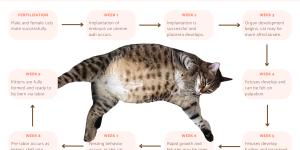

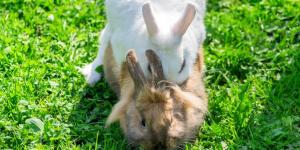


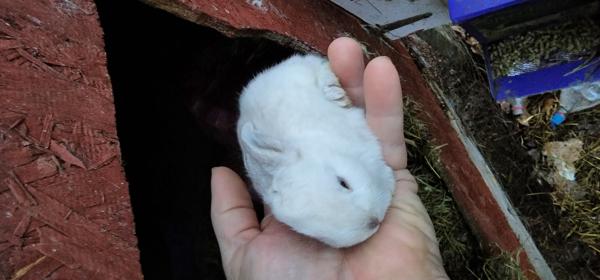 Was given 2 young "males" by someone who no longer wanted to care for them. I just put them in a old hutch in the back to keep until i could find a good home for them, but its 2022 so one identified as a doe. didn't notice until i saw small bunnys hopping around. got the buck out but doe is fatter than he is, probley prego again. what happens to first litter when she drops the next? and how can i find out how old they are?
Was given 2 young "males" by someone who no longer wanted to care for them. I just put them in a old hutch in the back to keep until i could find a good home for them, but its 2022 so one identified as a doe. didn't notice until i saw small bunnys hopping around. got the buck out but doe is fatter than he is, probley prego again. what happens to first litter when she drops the next? and how can i find out how old they are?


